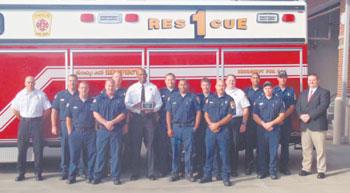 Several months ago, my column titled “Racial diversity in the Fayetteville Fire Department: Rest of the story” addressed the issue of there being very few black firefighters in our city’s fire department. I agreed that where the Fayetteville population is 41 percent black and 45 percent white, it is unacceptable that only 2.7 percent of the department’s employees are black. In another column during the same period, I objected to how this matter was addressed by some members of city council during a meeting where Fire Chief Ben Major did a presentation. That presentation detailed the diversity problem and what was being done to increase black representation in the department. The column title was “Successfully controlling the thoughts and actions of Black Americans.” Both columns are on my website at www.karlmerritt.com/category/articles/.
Several months ago, my column titled “Racial diversity in the Fayetteville Fire Department: Rest of the story” addressed the issue of there being very few black firefighters in our city’s fire department. I agreed that where the Fayetteville population is 41 percent black and 45 percent white, it is unacceptable that only 2.7 percent of the department’s employees are black. In another column during the same period, I objected to how this matter was addressed by some members of city council during a meeting where Fire Chief Ben Major did a presentation. That presentation detailed the diversity problem and what was being done to increase black representation in the department. The column title was “Successfully controlling the thoughts and actions of Black Americans.” Both columns are on my website at www.karlmerritt.com/category/articles/.
Thinking the matter was being successfully addressed, I moved on to other topics. Then an article by Jeff Thompson in the Jan. 10-16, 2018, issue of Up & Coming Weekly grabbed my attention. The headline was “Dealing with lack of diversity.” Thompson reported on a Jan. 2 work session of the Fayetteville City Council where Fire Chief Ben Major provided an update regarding efforts to improve diversity in the department. Given that there had been no noticeable increase in the number of blacks in the department, the discussion turned to causes and possible solutions. Thompson’s article included two quotes that prompted me to follow up. Councilman Jim Arp was quoted as saying to Major, “‘You need to open the tool box.’” Mayor Mitch Colvin was quoted as saying, “‘You’re the professionals, so figure it out.’”
I contacted both men to further discuss their comments. Arp explained that he was encouraging the examination of a wide range of actions that might increase black representation in the department. He mentioned one tool that he raised in the meeting and that Thompson reported: “allowing certified firefighters from other communities to be hired.” Adding to this tool, Arp suggested hiring individuals based on their potential for, through training, gaining the skills not currently possessed that are required to qualify for hiring; recruiting at gatherings of firefighters, such as conventions; and outreach to students approaching high school. Other tools were discussed, and I left that conversation better understanding Arp’s “tool box” comment and appreciating his overall point.
The discussion with Colvin was, in my estimation, equally productive by way of better understanding his comment of “‘You’re the professionals, so figure it out.’” Colvin explained that he sees the role of council to be one of setting policy. In the case of fire department diversity, that means providing a framework within which the department is able to successfully address the issue. In line with this thinking, the following is from his email to me after our conversation:
“As I mentioned, I am equally concerned with the department’s employee diversity. Our department’s 2.7 percent, compared to our municipal peers who have nearly 5xs the number of minorities.
I am hopeful that we can maintain our high qualification standards and never compromise on the physical and academic requirements. However, it is fair to ask the question why the interview process accounts for 60 percent of the scoring matrix. The interview carries more weight than the applicant’s physical and academic combined (score). This may be our problem.
Monica Vendituoli, Fayetteville Observer staff writer, summarized the Jan. 2 discussion appropriately in an article headlined “Lateral hiring, interview discussed to improve firefighter diversity.” In it, she said, “Lateral hiring, a consultant, a symposium and changing how interviews are handled were all suggestions on how to diversify the Fayetteville Fire Department that the City Council discussed during a work session Tuesday night.”
I do not doubt for a moment that there is a sincere effort underway to increase the number of black firefighters in Fayetteville. What troubles me about this effort, and so many others across our nation and around the world, is the seeming unwillingness to confront and address the core causes of, and effective solutions to, the problems that plague us. Rev. Robby Gallaty shared an experience that illustrates this point. It appears in the Sunday school book “Bible Studies for Life: Winter 2017-2018.” Gallaty wrote, “When I came home from work one day, I discovered a pipe had burst in the bathroom and the room was filled with water. I attacked the leak with towels and a mop as quickly as I could. I would haul out a bucket full of water and return to mopping up more water. I did this repeatedly. I never made any progress because as I hauled water out of the bathroom, more water replaced it by the time I got back.
“The problem? I wasn’t fixing the source of the trouble, only masking it. I wasn’t able to solve the problem of water in the bathroom until I got to the root of it and fixed the burst pipe.”
What was outlined in that working session, if pursued, will likely increase the number of black firefighters for a while but will not lead to maintenance of acceptable levels over the long term. These actions are like mopping but not stopping the leak. Here is what I mean. The following is from my column titled “Successfully controlling the thoughts and actions of black Americans,” published in June 2017. Referring to a chart presented to council by Major showing statistics from the then most recent round of hiring, I wrote, “The chart showed the following regarding black males: Total applicants, 130; eliminated at review, 20; failed to schedule exam, 40; no show at exam, 17; withdrew after exam, 1; failed exam, 25; did not schedule PAT, 1; did not show at PAT, 3; failed PAT, 2; successfully completed these steps, 21 (out of 163 eligible at this stage).
Then, I wrote, “Honest examination of facts would require drilling down to determine why the black male numbers at every critical step in the hiring process reflect far less than acceptable or reasonably expected performance. For instance, why would 31 percent of black male applicants fail to self-schedule for the written exam? How is it 48 percent of black males who took it failed an exam written on a 10th-grade level? Against this backdrop, consider the following from a 2011 Policy Notes report. The report comes under the heading “Addressing Achievement Gaps: Positioning Young Black Boys for Educational Success” and can be found at https://files. eric.ed.gov/fulltext/ED528986.pdf: “Average black male achievement falls far below that of white and Asian boys. Only 12 percent of black fourth grade boys are proficient in reading, compared to 38 percent of white boys. Only 12 percent of black eighth grade boys are proficient in math, compared to 44 percent of white boys. By fourth grade, black students may be three full years behind their peers.”
This statement of fact regarding the proficiency of black boys in reading and math points to what is probably the most impactful factor in poor test performance by black males applying to become Fayetteville firefighters. Nowhere in the discussion of the problem have I heard this consideration raised. Like stopping bathroom flooding, attention must be given to causes. That gets into really treacherous territory because one must look at parenting performance, cultural influences, societal norms, individual attitudes and several other factors. Giving attention to any of these factors is now contrary to political correctness and very high-risk for politicians.
I suggest that Colvin and members of council meet with Major and appropriate personnel to, in a civil manner, define the problem, forthrightly assess causes, brainstorm solutions, and develop a plan for resolving the issue. Keys to success of such an effort are civility and forthrightness.
My wife asked me what I was writing about in this column. When I said, “lack of diversity in the fire department,” knowing that I had written on this topic before, she asked if there would be anything new. My response was, “Probably not, but there are times when repetition is needed.”

 How to resolve AdBlock issue?
How to resolve AdBlock issue? 









